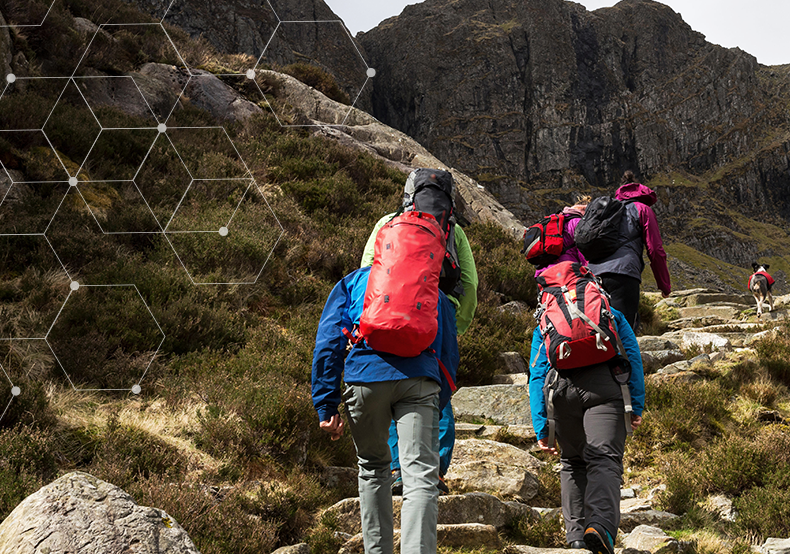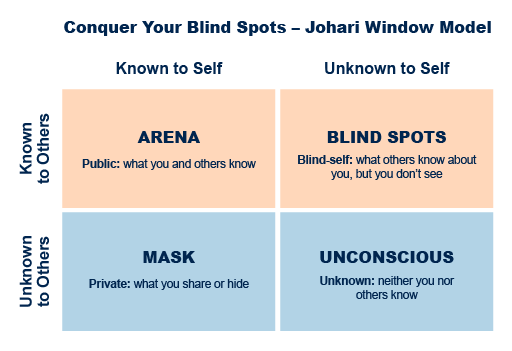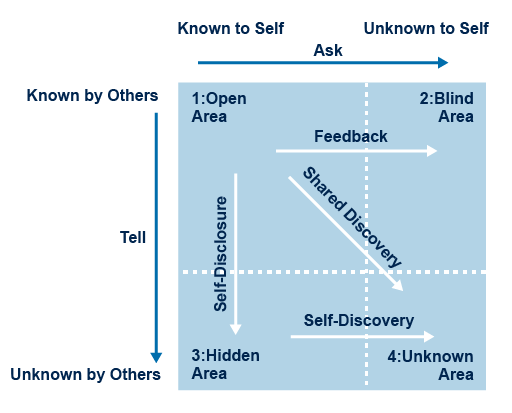2.7 Developing self-awareness
In this section you will be introduced to a tool for thinking about and developing your levels of self-awareness.
The Johari Window is named after its originators, Joseph Luft and Harrington Ingram. It consists of four areas, shown in Figure 5, and looks like the separate panes of a window.
- The open (also known as arena) area covers what you know about yourself. You know about this aspect and are happy to share it with others. An example might be if you are happy to tell someone about the strengths that you bring to your job.
- The blind (also known as blind spots) area covers what other people know about you but of which you are not aware. You might, for instance, be unaware of always using a particular phrase that irritates everyone with whom you come into contact.
- The hidden (also known as masked) area is what you know about yourself but would prefer other people not to know. For example, this could include opinions that you do not want to share with others as well as any weaknesses that you feel you have.
- The final area is unknown both to you and to others. This area is sometimes called unconscious. This might include hidden talents, unconscious feelings, or abilities and qualities that have never been brought to the surface. In other words, it may represent resources that could help your learning. Getting involved in new activities with new groups of people increases the chances of your finding out about these, as yet unknown, resources.
How to use the Johari Window
The purpose of the Johari Window is for individuals to learn more about themselves and how others perceive them. It is a tool that can facilitate conversations about team members’ strengths and blind spots, which will enable the team to work together better. Information is revealed in four ways: self-discovery, self-disclosure, shared discovery and feedback, as shown in Figure 6.
You will also see in Figure 6 that each of the four quadrants is not necessarily equal in size and they will vary depending on:
- how much you share with other people
- how well others (try to) know you
- how well you know yourself
Activity 12 Carry out a self-assessment
Choose the five adjectives from the list below that you feel best describe you. Be objective and honest.
| Able | Extroverted | Mature | Self-assertive |
| Accepting | Friendly | Modest | Self-conscious |
| Adaptable | Giving | Nervous | Sensible |
| Bold | Happy | Observant | Sentimental |
| Brave | Helpful | Organised | Shy |
| Calm | Idealistic | Patient | Silly |
| Caring | Independent | Powerful | Smart |
| Cheerful | Ingenious | Proud | Spontaneous |
| Clever | Intelligent | Quiet | Sympathetic |
| Complex | Introverted | Reflective | Tense |
| Confident | Kind | Relaxed | Trustworthy |
| Dependable | Knowledgeable | Religious | Warm |
| Dignified | Logical | Responsive | Wise |
| Energetic | Loving | Searching | Witty |
Next ask a friend or a trusted colleague/team member to evaluate you as well. Ask them to be honest and objective in selecting their five adjectives. You could ask family members, but you might find that they say something completely different, as they are unlikely to have seen you in a work context.
Next compare their list of adjectives with your list.
- Where an adjective appears on both lists, place it in the open area.
- If an adjective appears on your list, but not your friend/colleague’s list, place it in the hidden area.
- When an adjective appears your friend/colleague’s list, but not on your own, put it in the blind area.
- Any remaining adjective that appeared on neither list can go in the unknown area.
Finally reflect on whether there are there any adjectives that you are surprised to see that someone chose to describe you that you hadn’t used.
Discussion
None of these areas is fixed. We can increase the size of the open area by asking other people to tell us what they know about us – in other words, by asking them for feedback. We can also increase this area by revealing hidden aspects of ourselves to other people. We can reduce the size of the unknown area by looking into ourselves (self-discovery) or by finding out about ourselves with the help of others (shared discovery).
If you’ve used the Johari Window before, do you think the pandemic and/or hybrid working has affected the adjectives you or your friend/colleague chose?


